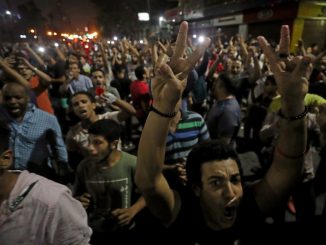
By: Amer Abdel Moneim*
Does it make sense that a government, anywhere in the world, decides to sell the heart of the capital to foreigners without reference to anyone? Is it logical to transfer the government buildings and headquarters, without any convincing study, into the unknown in the desert, and sell its property without discussing this matter with the members of such a government? Is there any parliament in the world that cannot discuss a decision that will expel it from the Capital while its members do not even know where, how or when they will hold their parliament sessions?
Unfortunately, this is what is happening in Egypt. The current regime puts up the property of the Egyptian government in central Cairo for sale, and opens an auction – which is the most dangerous one after the sale of the public sector companies – to sell the headquarters of ministries and government buildings, including the Mogamma (Tahrir Complex) with reference to no one, as fast as a burning missile. In fact, the Egyptian government is insisting on the implementation of the Zionist plan to sell the heart of Cairo to Zionist and foreign investors, with no voices to oppose or protest, or media programs to discuss the disaster, or even one single voice of the politicians who used to speak in everything, as if they have buttoned their mouths.
In a new step that underlines urgency in the implementation (of selling Cairo), Dr. Mustafa Madbouli, the Minister of Housing, announced a few days ago that the government is willing to sell the property of 18 ministries, including lands and buildings in the center of the capital for allegedly transferring them to the new administrative capital. Madbouly also informed the concerned ministries of the need to send the architectural drawings of the buildings which will be evacuated, to the Ministry of Housing for the preparation of the final visualization and the financial and technical evaluation of buildings and land that will be offered for sale to foreign investors.
Mustafa Madbouli’s statements confirm that the external circuits, that are setting the plans, are not hampered by the changing political systems, or stopped by the state of political deterioration and conflicts. The plan goes as it is, in all its details, even with the change of governments and regimes.
The Zionist Perception of the Heart of the Capital
The United Nations Office for Human Settlements has been able to pass the plan of selling Cairo through the Egyptian Urban Planning Authority and the Ministry of Housing, and impose the Zionist vision of Cairo in 2050 after the expulsion of the Egyptians and the Government from the heart of Cairo, selling everything to multinational companies, for establishing a settlement that will enjoy an independent self-rule as a Western Zionist protectorate in the east of the Nile.
The summary of the plan revolves around the following:
- Reducing the population density east of the Nile through the expulsion of the population to the west of the Nile, in preparation for the Zionist dream ‘from the Euphrates to the Nile’.
- Expulsion of the Egyptian government from the heart of the capital and the sale of all the property of the central government to the Zionists, foreign investors and multinational companies.
- A new system of rule will be established in the heart of the (Central) Capital, controlled by the foreign representatives of international companies that will buy the property of government and citizens.
- The establishment of a settlement more like the Green Zone in Iraq under the foreign influence, to be the nucleus for future expansion to swallow more of Cairo districts that will be removed under the pretext of being dangerous and unsafe random areas. The published images in the Zionist plan reveal the vast difference between the east of the Nile under the control of foreigners where there are towers and skyscrapers on the one hand, and the poor west of the Nile, where the Egyptians live, on the other. The river will then act as a new apartheid line.
- Transference of Cairo markets that are as old as the capital to the desert, and the displacement of its residents and the demolition of districts within the framework of the misleading slogan of the campaign for removing slums!
Dangers of the Evacuation of the Cairo Markets
The evacuation of the Cairo markets is the most dangerous step which would lead to unimaginable social and political effects. It seems that there is urgency in its implementation through the repeated statements of Egyptian officials about the need to get rid of these markets, claiming that they are dangerous and the government is unable to secure them. Also, the officials usually describe them as being random to legitimize the decision of destruction and removal.
Interestingly, the government’s announcement of the evacuation of the markets in Cairo comes accompanied by the outbreak of vague fires in a number of these target markets, which raises doubts about a possible subversive role of certain circles linked to this Zionist plan, working on the evacuation through sabotage and arson, and imposing a new status quo that would weaken the state of the anticipated resistance against the efforts of the government, which will resort to coercive force to accomplish the removal as soon as possible.
We can summarize the most prominent risks of the dismantling and the destruction of the Cairo markets in the following:
- These markets are the backbone of the Egyptian economy, on which all markets in all Egyptian governorates depend; they distribute the products of factories and workshops through the wholesale and retail, according to the way all the Egyptians with all their social levels are accustomed to ; thus, they stimulate the wheel of the national production.
- The survival of these markets prevents the economic collapse through foreign plots as it is the case in the countries that rely on the stock market. By dealing in goods, not in stocks that rise and fall for reasons that are not understood, these markets have kept the Egyptian society over hundreds of years despite what has happened in Egypt of distress and tribulations.
- These markets are the rival of the modern commercial complexes (malls) that are backed by multinational companies. They entirely depend on the domestic industry, develop the small industries and crafts, and prevent them from extinction, while malls are operated by foreign investments that promote the foreign industry rather than the domestic products.
- These markets are not a group of shops and department stores, but they are integrated communities, on which millions of Egyptians depend. So, the transfer process means the displacement of associated citizens and sending them to the unknown. The removal of the markets will necessarily be followed by the evacuation of the population by force.
Destruction of Civil Economy and Displacement of Millions of People
If we take the Khan el-Khalili area as a model for the markets that the deputy governor of Cairo said that the government intends to evacuate; it is one of the largest centers of the heritage of Islamic art in the Arab world, along with being an important tourist destination that has an enormous international popularity. The Khan el-Khalili market includes more than 30 various crafts, employing more than 300 thousand workers.
So, the presentation of the idea of removing the Khan el-Khalili markets explains the size of aggression and the desire for destruction. It even contradicts any sound scientific thinking, as well as being inconsistent with the concern for the national economy.
The number of people who depend on Cairo antique markets is estimated at millions, which makes things more obvious that the evacuation is not only intended to hit the economy, but it is also to shift the population away from the new intended settlement.
We cannot separate what is going on to destroy the markets of Cairo from the series of destruction of the Egyptian economy since the eighties, which began with privatization and sale of the public sector companies. The international institutions such as the International Monetary Fund, the World Bank, and the World Trade Organization succeeded in dispelling the government’s wealth, impoverished it and terminated its economic role through selling the factories, dismissing the workers, and stopping the production. Moreover, the Egyptian-Israeli cooperation succeeded during the eighties and nineties in the destruction of the Egyptian agriculture. It seems that it is now time for the destruction of the civil economy to topple Egypt completely.
We are in front of the strangest auction in Egypt, where everything is up for sale, with no control in a climate of fear which makes silence is the master of the situation. The wise people are keeping silent where silence is now considered a kind of betrayal. Though the Egyptians see their homeland while being sold, a piece after another, however, no one dares to just protest, or even utter a word, as if they have been completely anesthetized.
*Amer Abdel Moneim is an Egyptian writer.
(Published in Al-Jazeera on Tuesday, June 14, 2016, and translated for MEO)



